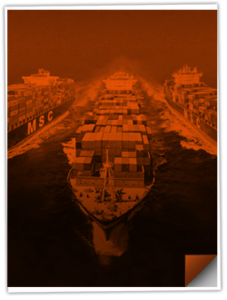Featured Headlines:
CPSC Proposes Standards on Clothing Storage Units
FTC to Extend Public Comment Deadline
2022 HTS Modifications Have Arrived!
Charleston Chassis and Congestion Woes
Vancouver Intermodal Going off the Rails
An Asian East Coast Tidal Wave
Ocean Alliance Network Changes
Lufthansa Cargo Re-opens Frankfurt Hub
US Airlines Limit Cargo Service Due to Major Storm
AMS in ACE
- Filing of US Department of Agriculture (USDA) Agricultural Marketing Service (AMS) Marketing Orders (MO) will become mandatory on February 28, 2022.
- At that time, importers of regulated avocados, grapefruit, kiwifruit, onions, potatoes, table grapes, field-grown tomatoes, pistachios, dates, hazelnuts (filberts), olives, raisins, and walnuts will be required to electronically provide product and load information in ACE.
CPSC Proposes Standards on Clothing Storage Units
- The Consumer Product Safety Commission (CPSC) is proposing new safety standards for clothing storage units—such as chests, dressers, and wardrobes— to address risks of injury or death associated with units tipping over.
- According to the rule, clothing storage units (CSUs) will need to be tested for stability, exceed minimum stability requirements, marked, and labeled with safety information, and bear a hang tag providing stability performance and technical data.
- This could have “significant impact” on a substantial number of small manufacturers and importers, as most CSUs don’t meet the proposed standard, making costly redesigns and additional manufacturing necessary for compliance.
- The CPSC is requesting comments on the proposed rule by April 19, 2022.
FTC to Extend Public Comment Deadline
- The Federal Trade Commission (FTC) announced it is extending the deadline for retailers, consumer goods suppliers, wholesalers, and consumers to submit voluntary comments as part of the agency’s inquiry into supply chain disruptions until February 28.
- Click here to submit a comment (FTC-2021-0068).
2022 HTS Modifications Have Arrived!
- Per our earlier announcement, the major changes to the Harmonized Tariff Schedule became effective on January 27.
- If you are unsure how the changes affect your products, or if you need further guidance and assistance, please contact us!
Charleston Chassis and Congestion Woes
- Charleston is exhibiting extreme export congestion and a severe chassis shortage; this week, 19 container vessels were waiting offshore for a berth—an increase of 40% compared to the last week of December.
- Vessel wait time has also increased to 9 days due to labor shortage, high import volume, and weather events.
Queue Up the LA/LB Vessels
- About 10% of the daily workforce has been reduced due to COVID-related absences at the LA and Long Beach (LA/LB) ports in January, which isn’t helping the queue of 100 vessels waiting in the “wings” over the past two months.
- Vessel waiting time is also up to 35 days due to yard congestion, high import dwell, and labor shortages in Los Angeles.
- The LA/LB ports have also agreed to a request from the White House to resume charging a traffic mitigation fee (TMF) for daytime-only truck moves in a bid to encourage shippers to use off-hour gates. This becomes effective February 14 and, as announced Tuesday, requires Federal Maritime Commission (FMC) approval.
- Shippers will pay a reduced TMF on both daytime and nighttime truck moves for the next two weeks to allow all parties enough time to prepare for the changes.
- In November, LA/LB terminal operators agreed to implement a test program, raising the TMF to $78.23 per TEU on daytime container moves, to see if the higher fee pushed additional truck moves to off-hour gates. Although the test period failed to produce evidence of a boost in nighttime activity, port officials requested additional time to let the program play out.
It's Steaming Omicron
- The Omicron COVID variant has impacted all supply chain intermediaries, including steamship lines, terminals, trucking companies, and warehouses; the result is an increase in congestion and delays.
- Industry analysts predict the next coming weeks will be very challenging for terminals and port trucking operations, as there is no indication that global port congestion will ease in the near term.
- North American ports currently account for 80% of congestion.
Party in the USDA
- The USDA has announced a partnership with the Port of Oakland to create a new 25-acre staging area reserved for agricultural exports. Empty container exports at the port climbed to 373,404 TEUs during 2021—an 8.1% increase.
- The goal is twofold: To avoid congestion on the docks with faster pick-up, as well as to circumvent the additional fees charged by ocean carriers.
- In addition to paying 60% of the cost to start up the latest “pop-up” container yard, to help offset the logistics costs of getting the containers to the yard, the USDA will provide shippers using the yard a $125-per-container subsidy.
- Truckers will also be able to bypass marine terminal gates.
Vancouver Intermodal Going off the Rails
- Intermodal rail service in Vancouver continued to deteriorate this week after devastating rain and snowstorms hammered British Columbia’s surface infrastructure.
- As a result, excessive rail container dwell times are now a major factor contributing to the port congestion.
Antwerp Gets CyberPunked
- After falling victim to a cyberattack, the s/s Independent Quest is now at ICL Antwerp terminal; cargo will be discharged and loaded on a manual basis.
- The s/s Independent Vision, which was delayed by a COVID-infection last week, is also waiting for a needed crew change.
- As a result, the s/s Independent Vision will now be sailing from Europe after the Independent Quest; it is uncertain when the Terminal will be open for collection/delivery of containers, but ICL anticipates more news on this in the coming days.
Top Dog Imports
- The pet food industry is facing unprecedented demand due to a surge of interest in pet adoption during the pandemic. (Even before the wave of pandemic pet adoptions hit, North America long held the largest market share of the global pet food industry.)
- In 2020 alone, the US exported more than $1.7 billion worth of dog and cat food.
- Major markets like the US have seen—and will continue to see—domestic and global profits in foods that are organic, tailored to a specific nutritional need, or specialized for a pet’s age.
- Canada is currently the top importer of US pet food, with Japan coming in second.
To Russia Without Love
- The Biden Administration has stated that, should Russia invade Ukraine, the US will cut Russia off from its vital supply of semiconductors.
- As part of Biden’s strategy, the administration threatens to use government regulations to restrict not only chips made by US companies, but also chips made by foreign companies that rely on US equipment, tools, software, or designs.
An Asian East Coast Tidal Wave
- The demand for US East Coast shipments continues to rise; it is now predicted that an average of 742,500 TEUs will move from Asia to the East coast per month (January – April), which is up 25% from this time last year.
- These East Coast increases come from shippers’ efforts to avoid the US West Coast check points and backlog.
- In 2021, the East Coast handled over 14.8% more cargo than the previous year; this number is expected to spike even more in 2022 as the service lane bottlenecks on the East and the West Coast worsens.
Ocean Alliance Network Changes
- As part of the Ocean Alliance network update, CMA announced a service change that will increase its capacity from China/South Korea to Norfolk/Savannah/Charleston/Miami; these ships will carry up to 11,000 TEUs.
- The change was made to avoid the congestion in West Coast ports.
- The Ocean Alliance Network also announced that Zim will end a slot swap agreement with the 2M Alliance in April; the service lanes impacted run from Asia to the Mediterranean and from Asia to Vancouver/Seattle.
Lufthansa Cargo Re-opens Frankfurt Hub
- Following a brief closure of Lufthansa’s Frankfurt Airport (FRA) hub due to a COVID outbreak, Lufthansa lifted its embargo as of Monday, February 1.
- As operations resume, Lufthansa has begun accepting loose cargo bound for the US, Canada, and some European countries.
- Lufthansa’s operations at other major hubs (Munich, Vienna, and Brussels) will continue to operate normally.
US Airlines Limit Cargo Service Due to Major Storm
- Both United Airlines and Delta Air Lines have restricted pick-up/delivery operations at several airports in the Northeast due to the major storm approaching the area.
- Some of the major airports that will be impacted by these restrictions are JFK, LGA, BDL, ORF, BOS, and PHL.
- These restrictions are set to expire Monday, February 7.



